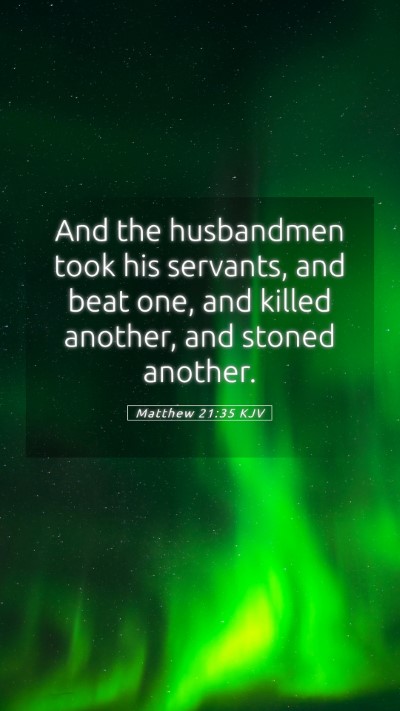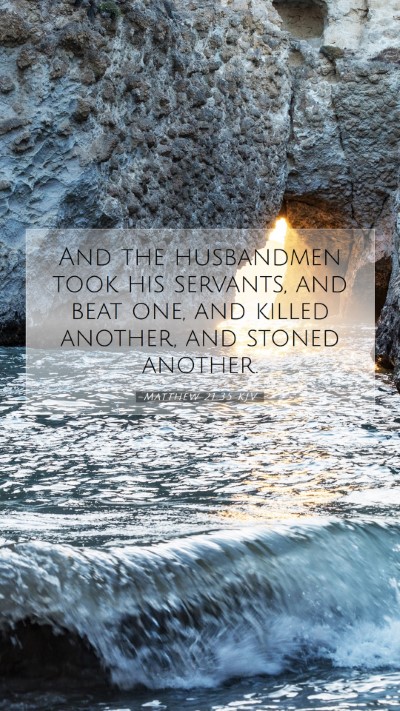Bible Verse Interpretation of Matthew 21:35
Matthew 21:35 reads: “And the husbandmen took his servants, and beat one, and killed another, and stoned another.” This verse is part of the parable of the wicked husbandmen, which Jesus articulated to illustrate the rejection of God's messengers and the consequences of disobedience. Here, we delve into the meaning of Bible verses through the insights of respected public domain commentaries, such as those by Matthew Henry, Albert Barnes, and Adam Clarke.
Summary of Matthew 21:35
In this parable, Jesus describes a landowner who sends his servants to collect the fruits of his vineyard. However, the husbandmen (farmers) violently reject the servants, which symbolizes the treatment of the prophets by the Israelites. This passage serves as a stark reminder of how God's messengers were often met with hostility and persecution.
Commentary Insights
Matthew Henry's Commentary
Matthew Henry emphasizes the historical context of the Jewish people’s rejection of the prophets and foreshadows the coming rejection of Christ himself. He notes that the actions of the husbandmen reflect the hostility of the leaders of Israel towards their divine messengers. Henry suggests that this verse serves as a cautionary tale: to be vigilant against rejecting God’s messengers, as retribution is inevitable.
Albert Barnes's Notes
Albert Barnes provides a deeper bible verse commentary by highlighting the idea that the servants represent the prophets sent by God. He interprets their mistreatment as a reflection of the people's ingrained disobedience and lack of respect for God's authority. Barnes articulates the significance of this passage in understanding historical context of Bible verses, noting that it reflects the broader attitudes of the Jewish authorities toward God's will.
Adam Clarke's Commentary
Adam Clarke elaborates on the symbolism in Matthew 21:35. He notes that the stoning of the servants signifies the extreme measures the husbandmen were willing to take to maintain their autonomy. Clarke draws parallels between this rejection and broader themes in scripture, indicating that the consequences of such actions can lead to divine judgment and the forfeiture of the blessings intended for the faithful.
Application and Significance
The application of Matthew 21:35 extends beyond the immediate narrative. It invites readers to reflect on their own responses to divine guidance and truth. The attitudes displayed by the husbandmen may resonate with contemporary readers, prompting introspection regarding their Bible study insights and willingness to accept divine wisdom in their lives.
Cross References
- Isaiah 5:1-7 - The Song of the Vineyard
- Luke 20:10-15 - The Parable of the Wicked Tenants
- Matthew 23:37 - Jerusalem, Jerusalem, who kills the prophets
Conclusion
Reflecting on Matthew 21:35 through the lenses of these commentaries provides a rich bible verse interpretation that deepens our understanding of scripture. It reinforces the importance of heeding God’s messages and the consequences of rejection. Engaging with texts like these is vital for those involved in Bible study groups or anyone seeking a thorough analysis of scriptural teachings.
For those looking to deepen their understanding Scripture, exploring the historical and spiritual dimensions of parables such as this offers invaluable lessons applicable to life's myriad circumstances.


